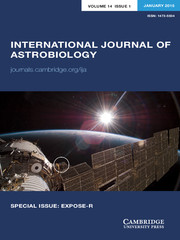Article contents
Extraction of amino acids using supercritical carbon dioxide for in situ astrobiological applications
Published online by Cambridge University Press: 02 April 2018
Abstract
The detection of organic molecules that are indicative of past or present biological activity within the Solar System bodies and beyond is a key research area in astrobiology. Mars is of particular interest in this regard because of evidence of a (perhaps transient) warm and wet climate in its past. To date, space missions to Mars have primarily used pyrolysis technique to extract organic compounds from the Martian regolith, but it has not enabled a clear detection of unaltered native Martian organics. The elevated temperatures required for pyrolysis extraction can cause native Martian organics to react with perchlorate salts in the regolith, possibly resulting in the chlorohydrocarbons that have been detected by mass spectrometry, a commonly used in situ technique for space applications. Supercritical carbon dioxide (SCCO2) extraction technique is a powerful alternative to pyrolysis that may be capable of extracting and delivering unaltered native organic species to an analyser. In this study, we report the SCCO2 extraction of unaltered amino acids (AAs) with simple laboratory analyses of extracts by capillary electrophoresis laser-induced fluorescence (CE/LIF) and liquid chromatography with mass spectrometry (LC/MS) techniques. The extraction efficiencies of several representative AAs using SCCO2 with small amounts of pure water (~1–5%) as a co-solvent were determined. Glass beads were used as a model substrate to examine the effects of several experimental parameters and Johnson Space Center (JSC) Mars-1A Martian regolith simulant was used to study the effect of complex matrix on extraction efficiencies. With optimized experimental conditions (75C and 5% of water), extraction efficiencies from doped JSC Mars-1A were found to be ~40% for glycine, alanine and serine and ~10% for lysine. Extraction of native organics from undoped JSC Mars-1A suggests that SCCO2/water solvent system can extract both organics extractable with pure SCCO2 and those extractable with pure water. Additionally, species not extracted by either pure SCCO2 or pure water were extracted with SCCO2/water solvent. Despite the preliminary nature of this work, it paves the path for more comprehensive extraction studies of astrobiologically relevant samples with thorough analyses of resulting extracts.
- Type
- Research Article
- Information
- Copyright
- Copyright © Cambridge University Press 2018
References
- 5
- Cited by


